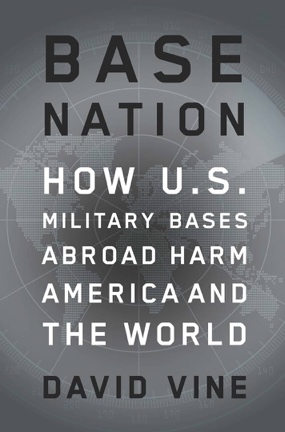American military bases encircle the globe. As of 2015, the United States controlled approximately 800 bases on foreign soil – including four in Australia. United States national security policy asserts that ‘forward presence’ contributes directly to global peace and security.
Base Nation does not describe the location and function of the bases themselves, but examines the social and economic impacts that the bases have on the communities and countries where they are located. It investigates the impact and costs of indigenous population displacement, and labour market and economic distortions, as well as environmental effects across a wide range of locations.

Metropolitan Books: New York; 2015; 420 pp.; ISBN 9781627791694 (hardcover); RRP $39.99
Vine argues – as his sub-title suggests – that the overseas bases raise geopolitical tensions and provoke widespread antipathy towards the United States. He further argues that they undermine American democratic ideals, pushing the United States into partnerships with dictators and perpetuating a system of second-class citizenship in territories like Guam.
The examples Vine cites are well-researched and compelling, but his findings and conclusions on the impact and costs of the bases cannot be applied to every situation. His conclusions, consequently, are unbalanced and he fails to test them against the counter argument that the bases actually do contribute directly to global peace and security. Amusingly, in his author’s notes, he admits that ‘no one is objective’, but I suspect that trying to gauge the contribution of United States bases to global peace and security would not have been achievable. Nevertheless, his investigation is revealing and, rather than an argument to close or reduce the number of bases, it may stimulate efforts for the negative consequences of the bases to be reduced.
Base Nation includes 16 detailed maps, a number of images and several tables. A comprehensive list of notes complements a list of online resources, and there is a detailed index.
Vine is the author of Island of shame: the secret history of the U.S. military base on Diego Garcia and an associate professor of anthropology at American University in Washington, D.C. His writing has appeared in The New York Times, The Washington Post and The Guardian.
The ubiquitous existence of United States bases around the globe makes this topic worth considering in itself and Vine has made a solid contribution to the debate on the pros and cons of them as a means for America to exercise national power. Base Nation is recommended to those who have an interest in the United States Department of Defence and its global footprint, as well as to students of geopolitics more broadly.
Contact Marcus Fielding about this article.






